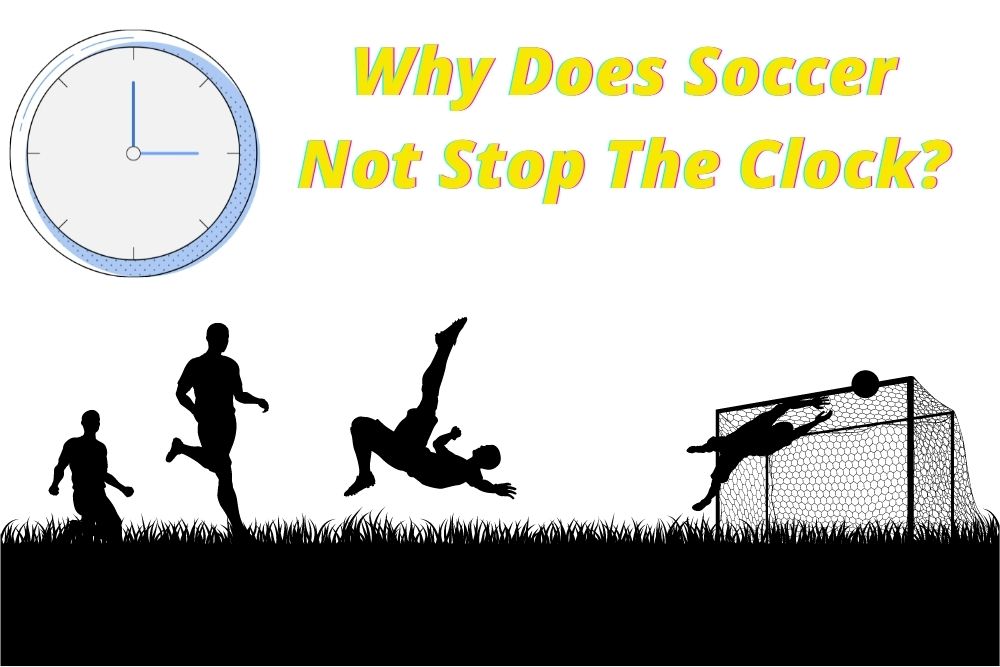In basketball, every period starts with the clock showing the maximum time. As the period begins, the clock starts counting down until it gets to zero and the bell or whistle goes off to signal the end of the period.
The same scenario plays out in boxing. Interestingly, for the majority of the games where the clock runs down, the time is paused if there is an infringement that causes a break in the game.
Well, soccer is not like every other game. The clock in a soccer game starts from zero and counts up—for interesting reasons—until the game is brought to a stop by the referee.
Regardless of the number of fouls, substitution breaks, or delay pranks by the players of the winning team, the referee will not stop the clock. Instead, time lost from any delay is added as a stoppage time.
According to IFAB Laws of the Game 7, the period of play of a soccer match is two equal halves of 45 minutes each. The clock only stops during half-time which should not exceed 15 minutes.
The only time that a clock can be stopped is when the match is abandoned for any reason. If an abandoned match is to be replayed, the time must resume from the point where it was stopped.
From the inception of soccer, the aim has always been to minimize interruptions as much as possible. Stopping the clock all the time will rob the game of that experience.
There are many other reasons why soccer does not stop the clock which goes beyond just the experience. Today, we are going to talk about all the reasons so that soccer enthusiasts and those who are just getting to know the game will become familiar with it.

Why does soccer not stop the clock?
Although soccer is supposed to be a 90 minutes game, rarely will you see a soccer game that ended at exactly 90 minutes. There is almost always a time added at the end of the game—and those who are not used to the game may think this is unfair.
However, to make room for minimal disruption, it became necessary to have a means of tracking all the time lost to in-game disruptions and make up for them. This helps to nullify any trick the winning team may bring up to run down the clock.
Come to think about it, every sport has the right to make its own laws. Soccer has decided to be different from every other sport. Below are some of the reasons why the organizing body decided to keep the clock counting upward without stopping in soccer.
1. Ensure minimal disruption during the game
Soccer has one of the highest chances of ending in a tie compared to other sports like basketball, football, hockey, and so on. That is already too much frustration for the fans who always gather to witness exciting goals from their team.
Also, soccer is a fast-paced game. Frequent stoppages will kill the tempo of the game and make it less interesting. This is also the reason why you will notice that the referee often refuses to stop the game when some players pretend to be seriously fouled.
Again, this is why soccer doesn’t have timeouts like every other popular sport. From the inception of the game, the intention has always been to create an environment for a free-flowing game for the maximum entertainment of fans.
It would be hard to achieve that dream if the clock had to be stopped every now and then.

2. Reduces the workload of the referee
Actions happen really fast in soccer and it is already hard for the referee to try and keep up with the action. If the referee had the extra role of having to stop his watch and restart it at intervals, there is a huge chance that the referee will miss out on some of the actions.
On the other hand, if the referee decides to focus too much on the game, there is a huge chance that they will not get their timing right. It is much easier for the referee to simply keep taps of time wastages and add them up at the end of the game as stoppage time rather than having to stop and start their clock at intervals.
3. Makes it easy to play soccer anywhere
Soccer is easily the most popular sport in the world with no fewer than 3.5 billion fans around the globe and 250 million players across 200 countries. One of the reasons for this popularity is due to the simple nature of the sport.
The use of a clock that counts up rather than down makes it relatable to our daily clock system. Also, it makes it easier for people in poorer regions of the world to participate in the sport because they wouldn’t have to invest in special countdown timepieces—their regular clocks will do the job.
In sports that make use of countdown clocks, there is usually a dedicated timekeeper that keeps track of the time. The introduction of an extra official and the purchase of special countdown timepieces will also blow up the budget which may be a limitation for people in poorer nations.
Come to think of it, countdown timers are not as common as regular count-up clocks. That automatically eliminates people who have no access to such timepieces from participating in the game.
Someone may argue that it is possible to use a regular clock in place of countdown timepieces—and that is definitely true. However, things will get complicated when you have to stop and restart the clock at intervals—and every soccer game usually has multiple delays.

4. Gives the referee full control over the game
Soccer is designed in such a way that the referee’s decision is final—even though there are times when their decision is questionable. If the clock was stopped in soccer, it will create a scenario where the referee will be obeying the clock rather than the clock obeying the referee.
That automatically means the referee will not have absolute control of the game. However, with a clock that doesn’t stop, the referee controls the players and the time.
A countdown time will also create conflict with the decision-making in the game. For example, the law of the game says that the game cannot end before a penalty is played.
As a result of this rule, the referee often allows a few more seconds for the game to run even when the stoppage time has elapsed. However, if the clock counts down, the referee would have to end the game as soon as the clock hits zero or they will run into a negative time.
Having a negative time in soccer would certainly generate anxiety and distrust from the fans. This will kill the passion for the game.
Another option would be to reset the time to the added minutes. For this to happen there must be a brief pause in the time which will eventually become more complicated than just allowing the time to keep counting upward.
5. Just following the law
For a new soccer fan that has followed other games where the clock counts down, the only justification that may make sense as to why the soccer clock never stops is that it is simply the law of the game.
The law of soccer makes provision for stoppage time to compensate for any time lost within the game. Some of the instances that the law clearly pointed out where time is lost within the game include examination or removal of injured players, substitution, disciplinary sanctions, official medical stoppages, deliberate time-wasting by the players, and so on.
To stop the clock in a soccer game, the law will have to be modified to do away with this clause as well as eliminate the addition of stoppage time.
6. Enhances the passion of the game
Soccer is a very passionate game filled with anxiety and fans that never get tired of chanting their support for their team. It is this emotional aspect of the game that has drawn a lot of followers to the game.
The unpredictable nature of the game adds to the anxiety of the soccer players and the fans too. If soccer made use of a clock that counts down, a player or fan can easily tell when the game will end.
Unlike every other sport, the climax of soccer usually comes at the last minute. This is because the referee will usually not end the match when an action, attack, or counterattack is in progress even when the additional time has elapsed.
So, only the referee can tell with certainty when the game will end. You can almost hear fans of both the winning and losing sides bite their nails in anticipation of the whistle.
Does the clock ever stop in soccer?
In professional soccer, the clock actually stops at halftime. For the knockout stage of a competitive tournament where the game exceeds 90 minutes, the clock stops twice; firstly during the halftime of regular time and secondly during the halftime of extra time.
For high school soccer, it is a different experience altogether. The US high school soccer is under the governance of the National Federation of State High School Associations (NFHS) and one of the features of this class of soccer is that the clock is allowed to stop within the game.
For example, after a goal is scored, the clock is stopped so that the goal celebrations can carry on. The clock is only restarted during the kick-off. Generally, NFHS allow the clock to stop in four different instances in the game namely;
- When the referee awards a penalty
- Once a goal is scored
- During an injury or other delays
- A foul that results in a card issuance
This is possible because NFHS makes use of a timekeeper that takes instructions from the referee on when to stop or restart the clock. Any soccer variation that is directly under the supervision of NHFS will likely follow this same rule when it comes to stopping the clock.
To further give the referee absolute control over the game like in professional soccer, the referee can give the order for the clock to be readjusted if it is not in sync with his wristwatch.
Before the conclusion of the game, an announcement is usually made to inform both teams of the remaining time.
Does the clock stop in futsal?
Other soccer variations do not always follow the same rules as Association Football. For example, futsal differs significantly from association football when it comes to time management.
Futsal games last for 40 minutes which is divided into 20 minutes per half with a 15-minute break in-between. In each of the halves, both teams are allowed to call timeout not more than once and each time out will last no more than 1 minute.
Also, the clock is stopped whenever the game is interrupted or the ball goes out of play. As a result of this, futsal has no stoppage time, injury time, or overtime.
Does the clock stop in beach soccer?
Beach soccer is another interesting soccer variation where playing time is divided into 12-minute periods with a 3-minute break in-between each period.
Just like futsal, the laws of beach soccer allow the clock to be paused when a goal is scored, when the referee perceives time-wasting, or when there is a foul or injury.
Although stoppage time is not also a feature in beach soccer, the game is more flexible with time than other variations without stoppage time. For example, a period will only end when the ball is out of play or stops moving regardless of whether the time has elapsed.
Does the clock stop in indoor soccer?
There is no place for stoppage time in indoor soccer too. This is because the clock can be stopped during injury time-outs or at the discretion of the referee when there is a perceived time-wasting tactic.
Like futsal, indoor soccer is divided into 2 halves of 20 minutes each. Whenever it is 1 minute to the end of each half, the referee in charge of the time will notify both teams.

Conclusion
A soccer fan that has never loved any other sport besides soccer will not have any problem with the rules of the game including the one that ensures that the clock counts up and never stops.
However, anyone that has been a fan of other games like basketball, football, volleyball, and so on will definitely find some of the soccer rules confusing.
Inasmuch as there are legitimate reasons why soccer should stop the clock, the game compensates for any lost time by introducing stoppage time.
Some people may argue that the reason that soccer is so popular is that its rules are quite different from every other sport—and that may not be far from the truth.
The introduction of stoppage time has helped to keep up the passion of the game and it is arguably the most emotional part of the game. Not knowing when the referee will blow the whistle keeps the tempo of the game high till the very end.
Hi there, I’m Jay.
Soccer is everything in my life! My friends and I have created this blog with all our enthusiasm, passion, and understanding after years of playing pro soccer. Hope you will enjoy it!
